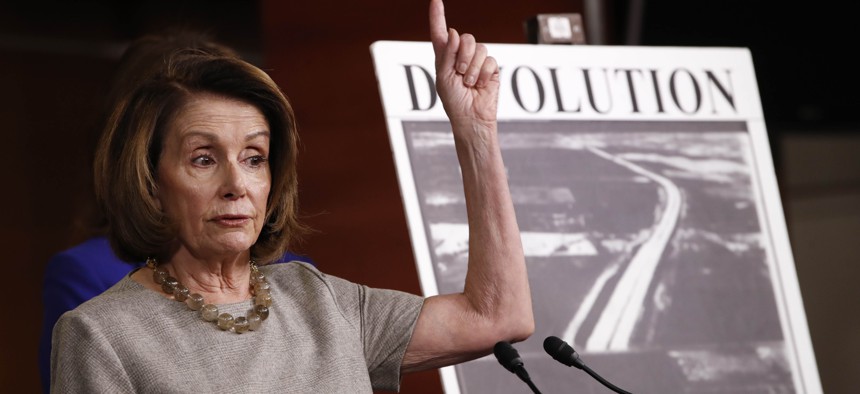House Dems Call for 5 Times More Infrastructure Spending Than What's Expected in Trump's Plan

House Minority Leader Nancy Pelosi of Calif., speaks to the media during a news conference about infrastructure, Thursday, Feb. 8, 2018, on Capitol Hill in Washington. AP Photo/Jacquelyn Martin

Connecting state and local government leaders
"The president talks a big act, but then he proposes a small bill," according to House Minority Leader Nancy Pelosi.
WASHINGTON — Democrats in the U.S. House on Thursday called for $1 trillion of federal infrastructure spending on public assets such as roads, railways, high-speed internet and schools.
A group of Democratic lawmakers made their pitch in advance of Monday's slated White House release of "principles" for President Trump's long-anticipated infrastructure proposal. Administration officials have indicated that the Trump plan will call for about $200 billion of direct federal spending over a decade.
"The president talks a big act, but then he proposes a small bill," House Minority Leader Nancy Pelosi, of California, said at a press conference. She described the president's approach to infrastructure as a "disappointment" and said it would shift burdens onto city and state budgets.
Trump in his State of the Union address voiced support for a plan that would involve combining direct federal funding with state, local and private dollars to reach at least $1.5 trillion of infrastructure investment—an increase over a $1 trillion figure the White House had floated earlier.
"What they want to do is devolve the obligation to build a national and coordinated transportation system to the states and the cities," said Rep. Peter DeFazio, of Oregon, who is the ranking member on the House Transportation and Infrastructure Committee.
"They don't even have the 200 billion they're talking about as a down payment," he added, referring to the amount of direct federal funding expected in the president's forthcoming plan. "They say 'we just can't find the money to do this, so the states, the cities, they'll have to pony-up and, oh, don't worry private capital will fill in this gap.'"
Odds are low Republicans will rush to support the Democratic call for a $1 trillion federal infrastructure program. And there's no clear answer how any sizable new federal spending on infrastructure would be paid for. Details about where revenues would come from were scant in a two-page summary of the Democrat proposal, issued by the House Democratic Policy and Communications Committee.
DeFazio has urged raising the gas tax. But there's been lukewarm GOP support for this idea, even though White House officials have said the administration is neither for or against it.
And the gas tax would typically only go to transportation infrastructure. So even if there were an increase in the tax, there would still be questions about where to find revenue to pay for added spending on public works like water systems and broadband.
A bipartisan budget deal congressional leaders announced Wednesday would up infrastructure funding levels by $20 billion over two years. But DeFazio said that amount is "nowhere near what we need" and also quipped that infrastructure "in Trump world means virtually anything."
"Remember they counted the Keystone XL pipeline as part of their trillion dollars," he added.
About a dozen groups, including the National Association of Counties, National Conference of State Legislatures, National Governors Association, National League of Cities and U.S. Conference of Mayors, issued a joint statement Thursday signaling support for the infrastructure discussions taking shape in the nation's capital.
"We welcome President Trump’s and Congress’ focus on infrastructure," the statement said.
It added: "We must find the correct balance between federal, state and local investments and private sector partnerships."
Bill Lucia is a Senior Reporter for Government Executive's Route Fifty and is based in Washington, D.C.

NEXT STORY: Securing the federal hybrid cloud





